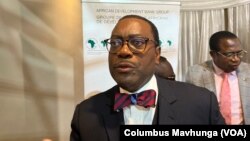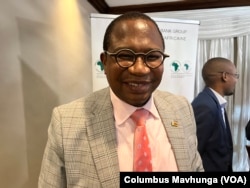The African Development Bank (AfDB) agreed this week to help Zimbabwe clear its $13.5 billion debt during a visit by the Abidjan-based lender's president. The AfDB has also started releasing loans from a $1.5 billion fund to help Africa avert a looming food crisis fueled by Russia's invasion of Ukraine. Zimbabwe is one of 38 countries set to benefit from the bank's fund, which is known as the African Emergency Food Production Facility.
African Development Bank, or AfDB, President Akinwumi Adesina said during his visit that Zimbabwe President Emmerson Mnangagwa had sought his assistance for Zimbabwe to clear its external debt, which started accumulating after the late Robert Mugabe’s administration defaulted.
“I believe that Zimbabweans, ordinary Zimbabweans, have suffered long enough. You have a country, a beautiful country in which you now have 40 percent of the population that is living in extreme poverty. And they do not have the resources to get out of that. So, we have to create a new hope, a new pathway so that tomorrow can be a better day than yesterday. Zimbabwe has a significant amount of debt areas that it needs to clear. But you cannot run up the hill if you are carrying a backpack of sand. So, Zimbabwe cannot run up a hill for its economic recovery and growth and prosperity if it’s carrying a backpack of sand,” he said.
AfDB and Zimbabwe are looking for ways Harare can get access to international financial money while the debt is being settled over a long period.
Mthuli Ncube is Zimbabwe’s Finance Minister.
“What we have done so far is to begin token payments for the African Development Bank, the World Bank, the European Investment Bank, and also all the 17 Paris Club partners. But what needs to be done is to fully implement the full roadmap for the arrears clearance. But for us to work well, we need a champion, and I am pleased to say that Dr. Adesina has agreed to be the champion, to cajole all partners around the world for us to be able to implement our arrears strategy,” he said.
Gift Mugano, an economics professor at Durban University of Technology, said the post-Mugabe government is still “reckless and careless,” and so the AfDB will not be able to satisfy the world on a plan to clear Zimbabwe’s arrears.
“In four years, our debt has doubled. Doubled because we were borrowing money recklessly, doubling because we created a new debt through white farmer compensation deed. There is also a component of debt, which we do not know where it is coming from because minister of finance is not going to parliament at each and every time he assumes new debt. If the government wants to clear the debt, it must stop increasing the debt,” said Mugano.
During his visit to Zimbabwe, AfDB President Adesina said his organization was filling a food security gap of 30 million metric tons caused by Russia’s invasion of Ukraine. That will come through the African Emergency Food Production Facility, a fund worth $1.5 billion.
“It will support Africa, produce 38 million metric tons of food with a value of $12 billion. Wheat, corn, maize, that will include 6 million metric tons of rice, 2.5 million metric tons of soyabeans. So, we are very sensitive to this. Africa has no business of going around with bowls in hand to beg for food. Africa has a business and must be in the business of putting seed in the ground and producing its own food and making sure that it can unlock tremendous agriculture potential that it has, but we can’t eat potential. We have to unlock the potential of agriculture,” he said.
Africa, Adesina said, imports mainly wheat and corn from Ukraine and Russia, as well as 2 million metric tons of fertilizers.





